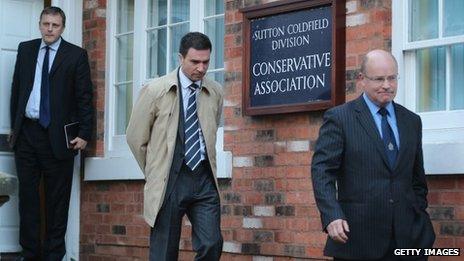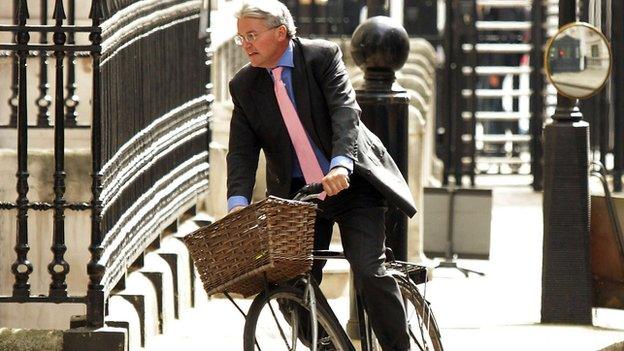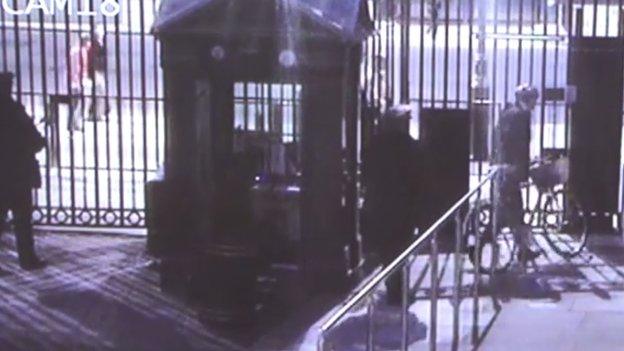IPCC's 'plebgate' decision quashed by High Court
- Published

The Police Federation complained a new IPCC investigation into Chris Jones, Stuart Hinton and Ken MacKaill would be "unlawful"
The police watchdog's decision to reinvestigate three officers at the centre of the "plebgate" row is flawed and must be retaken, judges have ruled.
The men were accused of giving a false account of a meeting with MP Andrew Mitchell, amid a row over whether he called Downing Street police "plebs".
They were cleared after investigations by their three police forces.
The High Court quashed the Independent Police Complaints Commission's decision to investigate the case itself.
Judicial proceedings were launched by the Police Federation, which represents rank-and-file police officers in England and Wales.
It had argued the IPCC's decision to reinvestigate the officers was "unlawful".
Judges sitting at the High Court in London said the investigations into the three officers had been "lamentable" while also criticising the former deputy chair of the IPCC, Deborah Glass, for showing an "apparent bias" over the case.
An IPCC spokesman said it "welcomed" the decision that the decisions of the three police forces had been "invalid" and said it would make a "fresh assessment" of the case.

Conservative MP Mr Mitchell denied using the word "plebs" but apologised for being disrespectful to officers
Following the "plebgate" incident at Downing Street in September 2012, then-Chief Whip Mr Mitchell apologised for using bad language but said he had not used the word pleb.
He later resigned as chief whip as the row continued.
Media briefing
A month later, in an attempt to smooth things over, Mr Mitchell held a meeting in his Sutton Coldfield constituency with Det Sgt Stuart Hinton, Insp Ken MacKaill and Sgt Chris Jones from the federation.
After the meeting, the three officers - who represented police in Warwickshire, West Mercia and West Midlands respectively - briefed the media.
But a transcript of a recording Mr Mitchell made of the meeting apparently contradicted the officers' account of what was said.
The matter was then referred to the IPCC, which decided not to conduct its own investigation but directed the forces the officers represented to launch their own inquiry.
All three police authorities concluded the officers had "no case to answer".

CCTV showed the apparent row, when Mr Mitchell was stopped from cycling out of Downing Street
However, Deborah Glass, then IPCC deputy chair, decided in October last year that the investigation into the officers' conduct should be turned into "an independent investigation" conducted by the IPCC itself.
The three officers applied to the High Court in London to have the decision quashed on the grounds the IPCC had no power to re-determine the case.
'Apparent bias'
Lord Justice Davies, sitting with Mr Justice Wilkie, ruled there had been a "series of errors and irregularities that was simply lamentable" within the individual investigations into the three officers.
He said the findings, which effectively cleared the officers of misconduct, had been "invalid" and ruled there should be a fresh investigation.
However, the judge said the "most troublesome" issue before the court had been allegations that Ms Glass had been guilty of "apparent bias" in her decision-making over the matter.
As the IPCC's deputy chair, Ms Glass had "publicly and repeatedly" made her disagreement with the decisions of the three police authorities known, the judge said.
Fairness meant that her decision must be quashed, he ruled.
Ms Glass's decision to order the fresh investigation was quashed by the court and the case referred back to the IPCC to reconsider the issue.
The judge observed that Ms Glass - who quit the IPPC for a job in Australia - would no longer be involved in the case.
In a statement, the IPCC said it welcomed the court's judgment that there was "no proper final report prepared for this investigation and therefore the decisions of the three police forces that there wasn't a case to answer for any of the officers were invalid".
"This is in line with our own view," it said.
"The IPCC will make a fresh assessment of whether or not to exercise its power to change the form of the investigation," it added.